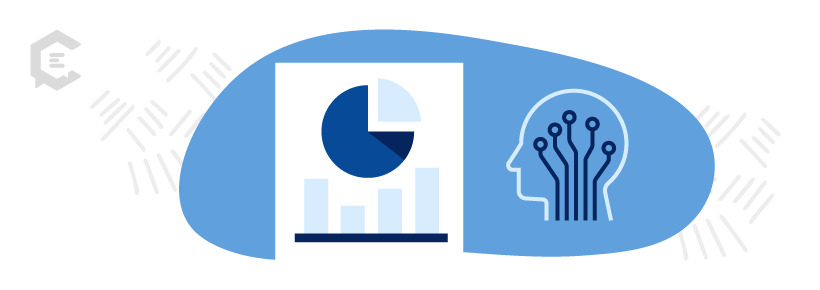Artificial intelligence (AI) is the combination of human intelligence and machine intelligence. What once seemed to be science fiction now affects our everyday lives. You may not even notice how often you use AI since digital assistants on phones and devices like Siri and Alexa have become a reality.
Even as you write emails and texts, Google (and other software) completes sentences with AI-powered writing. So, is artificial intelligence capable of generating marketing content? And is it possible for machines to create high-quality content that informs and engages real humans?
In a nutshell, yes. But it’s complicated.
Can artificial intelligence replace content writers?
The short answer is ‘no.’
Content generated by artificial intelligence becomes more coherent and human with every passing day. There is a good chance you’ve consumed articles that AI partially wrote without even being aware of it. Studies suggest that AI will create an estimated 90% of content by the year 2026.
However, it will be long before AI completely replaces human writers. Empathy or emotional intelligence is a factor that machine writers (or AI writers) cannot replicate. AI will probably never be able to truly replicate emotion.
What is AI-generated content?
Artificial intelligence-generated content is crafted by analyzing online data from existing content and summarizing it as a human writes. To do this, AI-generated content mimics human-created writing through natural language generation (NLG) technology.
AI-generated content creation in marketing has been rumored for quite some time, but its emergence has been slow. This changed in 2018 when OpenAI released the Generative Pre-trained Transformer (GPT). Now it is possible to generate large amounts of sophisticated AI-generated text using the GPT tool by only inputting a small amount of content.
Each updated release of the GPT tool features a higher level of intelligence and new, almost human-like capabilities. A significant increase in skill occurred when GPT-3 was released.
With each new version of the GPT tool, the expertise base on which it works has expanded – the datasets it stores and the abilities by which it works have increased, and thereby the sophistication of the content it creates has increased.
How is artificial intelligence content created?
In order to create content, artificial intelligence searches for and reads the most popular articles on the internet. Using artificial intelligence, it determines which articles are popular and which ones are not. These articles are read by AI and also evaluated for relevance. The AI then creates a similar article that is different enough from the ones with the highest traffic that it is not caught and identified as plagiarism.
Google prefers human-generated content
Google largely determines the fate of content that is created. The algorithm determines what ranking factors will put content at the top of the search engine results pages (SERPs) and gauges what is published with a level of intelligence approaching that of a human. Human-centered content that is helpful is what Google cares about the most.
Google’s goal is to provide a positive user experience on its site and will rank helpful content higher. Their definition of authentic content is content created by humans. Google’s evaluation of content is based on a human element, and likely, it won’t change anytime soon.
Human-created content features emotional intelligence
The GPT tools (along with similar programs) are becoming so talented at writing content that it seems like a human wrote it. So why isn’t technology in a place where it can completely replace humans?
Content marketing success comes down to one crucial factor: emotional intelligence. According to Forbes, “Mastering emotional intelligence means you’re able to pay attention to things like your brand tone and the way your audience engages with similar brands. Understanding these nuances allows you to know how this strategy affects marketing.”
Educating and informing your audience is the ultimate goal of content marketing. Through your content, you can help readers solve problems. Content gives value to the reader to help them make a decision. This connects people to your brand, making them want to learn more about it. Eventually, your audience will likely turn into paying customers by building trust through helpful content.
It is becoming increasingly important to be able to empathize with audiences and allow them to feel heard and understood in this age of information overload.
Artificial intelligence-generated content marketing tools may be able to organize all of the current content available from around the world and then produce original content based on that content. Additionally, the content can be high-quality while also sounding like a human wrote it.
However, these tools don’t understand what makes readers connect and resonate with content. Brand personality and voice are unknown to AI. The technology is also unfamiliar with maintaining brand cohesion or engaging with your audience. Only human writers can do that.
While it is possible to publish accurate but generic artificial intelligence content it won’t meet the unique needs of your audience without the assistance of humans. Worse, you risk sounding tone-deaf with the creation of AI-generated content. Machine learning algorithms can determine content but cannot distinguish between fact and opinion. Instead, they simply spit out relevant data points based on their interpretation of their obtained information.
Humans, on the other hand, understand that some issues or topics can make people laugh, and others can make them cry (or even both). Because of this, they can add emotion to writing through humor, wit, or gravitas.
But that doesn’t mean you can’t use this technology at all. There are many ways you can use these powerful artificial intelligence tools to improve your content marketing strategy and provide a launchpad for your content writers.
A quality-driven approach to artificial intelligence-generated content
Generating ideas
It is possible to generate numerous ideas for your brand by utilizing GPT tools. Based on content already on the web, you can instruct the tool to create blog titles or concepts for other content articles based on the information found. This can be based on focus keywords.
Creating drafts
In terms of generating long-form text, GPT tools are limited. Although it can produce grammatically correct content, it cannot produce long-form content like a human can. But using artificial intelligence to generate drafts or outlines gives writers a place to start adding brand-specific content.
Obtaining data
Searching the web for data and statistics about the topic you’re writing about can be made easier with AI-generated content marketing tools. AI tools make it easier to pull keywords and do competitor research for your target audience or niche. AI-based content tools are also useful for profiling customers and conducting market research. The information provided by AI-generated content tools could then be used to design marketing initiatives or campaigns targeting these consumers.
Editing content
While a human should preferably write your content, they can use artificial intelligence tools to edit the text that’s been created in just moments. Some AI word processors can automatically edit spelling and grammar errors as you type. This helps speed up the editing process while also cutting back the revisions required for each draft.
However, these AI editing tools don’t fully replace the human editor who can work with your writers to ensure the content aligns with your goals and your unique brand style.
Combat creative writer’s block
Artificial intelligence-driven content marketing tools are perhaps most popular among human writers because they help to combat creative writer’s block. Staring at blinking cursors on blank pages often evokes this dreaded feeling. AI tools can help you by generating an introduction based on your keywords and/or title.
This is helpful if you’re drafting content about a topic and don’t know where to begin.
Deciding between AI or human-created content
It is anticipated that artificial intelligence-generated content marketing will continue to become a popular marketing tool over the next few years, but it should not be utilized as a substitute for human content writers. Rather as an additional tool in a content creator’s tool belt. To put it in perspective, it’s possible that 99% of content will be generated using AI by 2030.
With AI tools, brands can generate ideas at scale and better understand their competition. However, they cannot capture a brand’s unique personality, message, and audience’s needs. Not only do you run the risk of being penalized by search engines like Google, but you also risk your customers losing interest in your business.
There is no doubt that obtaining the best possible results when it comes to marketing strategies requires human-created content. But that doesn’t mean that AI tools can’t be used when appropriate.
Human-created content
Do you want to boost the results of your content marketing campaign through human-created content that targets your customers directly? Our mission is to develop optimized, ready-to-publish content for your business every week for as long as you need it with the help of our ClearVoice writers and SEO experts.








